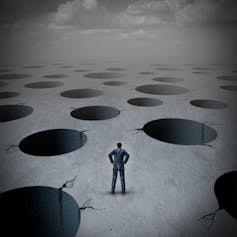Certain groups in society are often labelled as “vulnerable”. If you belong to one of these groups – as an older person, or someone with learning disabilities for example – you may well automatically be considered vulnerable, as though it is an inevitable personal characteristic.
But there are problems with this view, which tends to see vulnerability as a fixed state. Treating it as an inevitable consequence of belonging to a particular group reduces the potential to focus on how vulnerability might be reduced. It also overlooks the fact that we are all vulnerable. Vulnerability is an inevitable consequence of being human.
Indeed, COVID-19 has shown just how vulnerable we all are. Over the course of 2020, we have all had to change how we live our lives, and become vulnerable to loss of freedom, loss of social contact and loss of income. We have also had to deal with real concerns about access to healthcare and our own mortality.
Yet such experiences are everyday life for many people with learning disabilities and their families – and were so, long before the coronavirus emerged.
For example, among adults with learning disabilities in England who use social care services, only 6% are in paid or self-employment. This means most people with learning disabilities rely on welfare benefits.
Rates of social isolation and loneliness are also high among people with learning disabilities, who may be dependent on support from others to engage in all kinds of activities.
Before COVID-19 hit, there was already strong evidence that people with learning disabilities are at increased risk of premature and avoidable deaths. They also often suffer from limited access to appropriate healthcare.
This may be down to a lack of genuinely accessible information, or the fact that symptoms may mistakenly be considered part of their learning disability rather than an indication of ill health that requires intervention. As a result, if and when treatment is provided, it can be at late stage, leading to avoidable pain and distress or even treatment that is ineffective.
It seems then, that COVID-19 has suddenly led the wider population to share some of the everyday experience of people with learning disabilities.
Degrees of vulnerability
In the early stages of the pandemic it was often said that the virus does not discriminate. However, it has become evident that COVID-19 does affect different groups in different ways and calls are increasing for a better understanding of its varying impact.
As the pandemic spread, one of the things that people with learning disabilities were perhaps initially most vulnerable to was their invisibility in many of the discussions. Fortunately, this has begun to change.
It is becoming increasingly clear that the pandemic has had a significant impact on many disabled people across the globe, including those with learning disabilities. The campaign group Inclusion Europe has highlighted a range of social, economic and educational effects that have particularly affected those with learning disabilities.

In addition, changes to the ways we now access healthcare have proven challenging for many. But these challenges are even greater if you have difficulties in understanding new and sometimes complex information. This is likely to further increase the existing barriers to healthcare.
In some cases, coronavirus has led to day-to-day support services being withdrawn and respite provision suspended, placing additional stress on families.
Many people have become increasingly reliant upon the internet to maintain social contact with family and friends. But again, this is not an option if you do not have internet access or you require extra help to use it.
It would seem then, that even where everyone is experiencing increased vulnerability, some groups of people are still more vulnerable than others. But as restrictions are gradually lifted across the world, people are beginning to think about what elements of society can be changed for the better. This opens up space for us to all reflect on the nature of vulnerability and how it can best be tackled.
Being exposed to just some of the increased (but avoidable) everyday vulnerabilities often experienced by people with learning disabilities provides an opportunity for us all to think about what we can do as individuals and societies to improve their futures.
That will inevitably vary for each of us. But surely we can all become more aware of the barriers that exist, and work to eliminate them. The optimist in me sincerely hopes that this opportunity for society will be taken.
Ruth Northway, Professor of Learning Disability Nursing , University of South Wales
This article is republished from The Conversation under a Creative Commons license. Read the original article.




